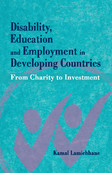Disability, Education and Employment in Developing Countries: From Charity to Investment

Within the context of the quickly approaching 2015 deadline to achieve the United Nations Millennium Development Goals (MDGs), there have been active discussions on the post-2015 development agenda. Throughout the process of discussions, ensuring the inclusion of persons with disabilities has been a critical issue in the international community. Data and empirical research have been limited even though persons with disabilities make up 15% of the world’s population and 80% of them are said to live in developing countries.
Based on empirical data from developing countries including Nepal, India, Bangladesh, Cambodia, and the Philippines, this book systematically analyzes the relationships between disability, education, and employment in developing countries. The book presents a unique interdisciplinary analysis that interlinks the fields of education, economics, philosophy, public policy and development studies with disability studies.
Analysis shows that barriers to education and employment of persons with disabilities include discrimination, lower levels of education, lack of vocational training opportunities, wage disparities, lack of school support, and poverty. It also reveals that investment in human capital in the form of education and employment, which enable persons with disabilities to find white-collar work, is one of the most important factors in promoting both social inclusion and economic empowerment. When education and labor markets are made inclusive and accessible to persons with disabilities, not only does their livelihood improve, so do the prospects of their families and society as a whole. In addition, the returns to investment in the education of persons with disabilities are two to three times higher than that of persons without disabilities.
Lamichhane advocates the need for an immediate paradigm shift from charity to investment and that governments and international organizations realize educational opportunities for persons with disabilities.
scroll